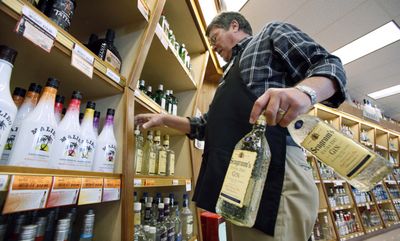Washington counting on boost in liquor sales
State sees revenue opportunity by expanding alcohol retailing

OLYMPIA – It’s as predictable as a hangover: In hard economic times, governments reach for the hard stuff, jacking up liquor taxes and loosening “blue laws” to siphon money from America’s most ubiquitous vice.
Booze prices are on the rise from Kentucky to Oregon, and lawmakers in nine states have considered tossing their prohibition on Sunday liquor sales this year. On the federal level, a higher alcohol tax has been mentioned as a possible moneymaker for national health care reform.
But in Washington state, officials are going a bit further. Staring down a massive budget deficit, the state Legislature has uncorked one of the country’s most aggressive attempts to capitalize on liquor sales.
The new steps, rolled out over the next two years, will transform the state’s relatively straight-laced monopoly on bottled booze retail, including:
•An expansion of liquor stores, either run by the state or licensed to state contractors. The plan will add a new liquor store every 60 days starting this fall, for a total of 15 new locations – five run by the state, 10 operated by contractors.
•New seasonal stores in shopping malls, focused on selling holiday gift packs of liquor right alongside the cheese-and-crackers kiosk and photos with Santa.
•Further erosion of a ban on liquor sales on Sundays and holidays. Most state stores will now be open on seven holidays, and nine more stores will join the previous 49 allowed to sell on Sunday.
•More sales of state Lottery games, and the debut of liquor store gift cards, to be sold only in liquor stores. “You wouldn’t pick them up at Home Depot or anything,” Liquor Control Board spokesman Brian E. Smith said.
State officials hope to make about $16 million from the new sales projects, which seem likely to draw cheers from consumers.
But there’s bad news as well: Regulators have increased the profit “markup” imposed by the state, which adds costs on top of the sales and liquor taxes consumers already pay.
The surcharge is expected to raise about $80 million over two years, replacing money that lawmakers raided from a liquor fund to balance the state budget. It takes effect Aug. 1, adding about $3.70 to the price of a bottle of premium whiskey.
The national distillers’ lobby has angrily criticized the markup as a “stealth tax increase” on liquor, and warns that higher prices could cost jobs in the hospitality sector.
Recession-pinched consumers will also notice, and could try to go around the state’s price hikes, said Paul Clarke, a Seattle-based writer and cocktail enthusiast who blogs at cocktailchronicles.com.
“Let’s be honest here. We live in a 21st-century world, where if you see a price at a liquor store on a particular product that seems outlandish, you can easily go online and order it from a retailer out of state,” Clarke said. “Especially consumers of the higher-end products, they’re savvy shoppers. I wouldn’t be surprised to see more people starting to buy their booze from out of state.”
Criticism of the state’s new liquor plans is also coming from grocery stores, which must compete with state-run liquor stores on profitable sales of beer and wine.
Jan Gee, president of the independent grocers’ Washington Food Industry lobbying group, said that makes the Liquor Control Board “a monster of two heads: Our regulator and our primary competitor.”
She also sees the moves as a conflict for state liquor regulators, who have a dual mission of earning money while trying to keep booze sales from expanding too rapidly, for fear of widespread social ills.
“What they say and what they do are two different things,” Gee said. “We don’t think it’s the role of the state to say, on the one hand, they’re all about temperance, and on the other hand promote consumption.”
That tug-of-war is inherent in Washington’s system, one of the country’s more restrictive regulatory schemes for packaged liquor retail.
Washington is one of 18 “control states,” which exercise broad powers over wholesale liquor distribution. Of those states, only eight also are involved in retail alcohol sales.
The stated reason for having the government so heavily tied up in the liquor business is to limit the supply of bottled booze, and keep prices high, to tamp down on the problems that can come with widespread alcohol abuse.
But control states also can earn more money than those which simply tax and regulate private liquor transactions, meaning the state winds up depending on growing sales of a product it’s also supposed to keep under control.
Regulators are always mindful of that balancing act, Smith said. In fact, until this year’s expansion, the number of liquor stores hadn’t increased in about four years. Meanwhile, a consultant’s report has recommended the state add seven to 10 stores a year to keep up with growth in the 21-and-over population, he said. “What we want to be able to do is to make our products available to the general public,” Smith said. “We don’t want to flood the market by any means.”